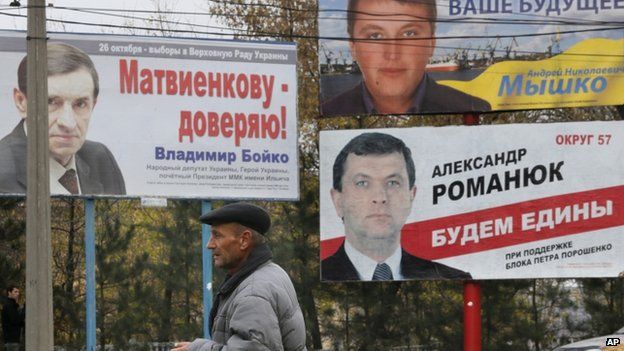Ukraine vote could push the country into chaos
-
Published

Five months after Ukrainians elected the pro-Western Petro Poroshenko to replace the Russian-leaning Viktor Yanukovych, who was deposed in a February mass uprising, Ukrainians once again are heading to the polls - this time to choose a new parliament.
President Poroshenko hopes this will cap the revolutionary process, and help stabilise the country, producing a legislature seen as legitimate by the population and with a clear mandate to pass needed reforms.
Right now, Mr Poroshenko's self-named political bloc is leading in the opinion polls and may secure an absolute majority. But it is equally possible that, instead of helping to introduce calm, the new parliament will become a centre of dissent and turmoil - and provide a springboard to groups which will challenge Mr Poroshenko's political programme, both inside the legislature and out on the streets.
The situation throughout the country remains brittle. The economy is disintegrating and the Ukrainian government is faced with a mountain of debt. A dispute over gas prices with Moscow means the country could suffer through a severe energy shortage this winter.
What's more, the war in the east could escalate at any moment. Right now, though fighting continues, it's percolating at a relatively lower level, giving Mr Poroshenko just enough breathing space to forge ahead with his political plans.
Rebel commanders in the past days, though, have raised fears of a return to full-scale combat.
The "prime minister" of the self-declared Donetsk People's Republic, Alexander Zakharchenko, has been quoted as saying his army could soon mount a campaign to take three towns in the region, Sloviansk, Kramatorsk and Mariupol.
"We intend to take them, to return them to us. So we don't exclude there could be heavy military operations," Zakharchenko said, according to Interfax news agency. Later, however, he said he was misquoted and meant the cities would be taken through "peaceful means".
White supremacist
Even if the "ceasefire" manages to hold, the war in the east will nevertheless dictate developments back in Kiev. The death toll continues to mount - more than 350 people have died since the truce was declared on 5 September - with fierce battles raging in a number of locations, especially around the charred steel husk of Donetsk's main airport.
Only a handful of election districts in the warring regions of Donetsk and Luhansk will be open. It also remains to be seen how many people will have the courage to vote or the desire, given the bitterness among a large part of the population, after months of shelling.
But once the deputies have taken their seats, the battle may shift inside the walls of the parliament.
Conceivably, nine political parties could pass the 5% barrier and enter parliament through proportional representation, based on their overall showing in the vote. Half of parliament's 450 seats are chosen through party lists and half elected directly through single-mandate districts.
Of these, besides President Poroshenko's bloc, three seem to have the highest chance: Prime Minister Arseniy Yatseniuk's People's Front, ex-PM Yulia Tymoshenko's Fatherland party, and populist leader Oleh Lyashko's Radical Party.
Parties from the far right, pro-European centre, and the remnants of the once-ruling Party of Regions could also cross the minimum threshold.
It is still unclear how any of these parties, or the over-sized egos that run them, will behave once in parliament. Moreover, many of the new faces are completely unknown quantities - such as the numerous paramilitary commanders on various parties' tickets, or Andrei Biletsky, a white supremacist commander running for Arseniy Yatseniuk's People's Front.
Social pain
The mood in the country is darkening. Eight months after the February revolution, a feeling is spreading that nothing has changed. Corruption is rampant, political and economic reforms are just being discussed, and the same faces populate the political elite.
Many question whether Mr Poroshenko, a billionaire with deeply vested business interests, truly wants to transform Ukraine into something more transparent and democratic.
If Mr Poroshenko does introduce reforms, many could initially cause profound social pain - such as raising the domestic price for gas. As necessary as this may be - in order to eliminate corruption in the gas industry and a massive budgetary black hole - it will unquestionably create an outcry.
The war in the east is another flashpoint. Mr Poroshenko's peace plan is highly unpopular. Many fear it has rewarded the militants and Russia, which has by all appearances supported the insurgency with weapons, organisation and troops, by creating two de facto independent states.
There is heavy criticism of the government's overall conduct of the war. Although the military seems in better shape than in the first disastrous days of the war, it is still badly equipped, and, according to many fighters, badly led.
For anyone who wants to mount an anti-government or anti-Poroshenko campaign, therefore, the potential pressure points are many.
And many in the new parliament may seize the opportunity, either because of true concern for Ukrainians, or out of personal ambition.